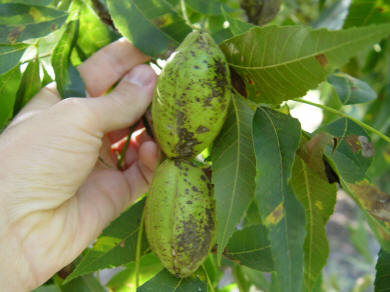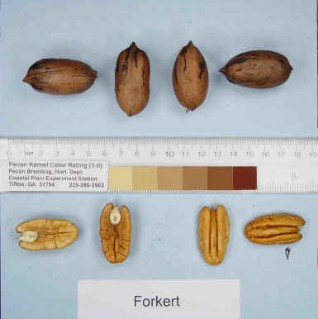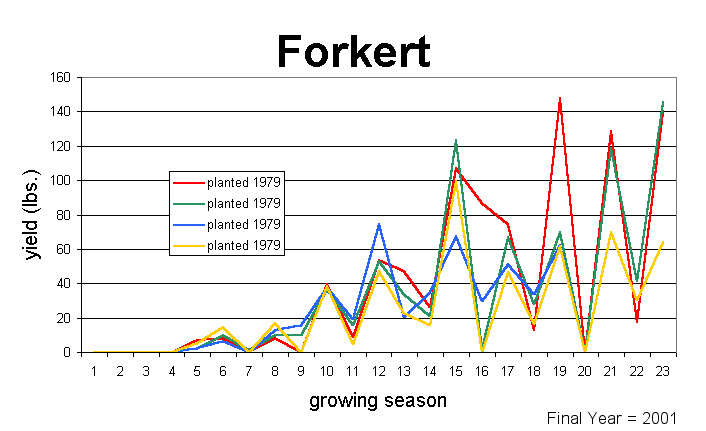Forkert
Average nut quality of test trees.
| # Nuts / lb. | % Kernel | Kernel quality breakdown | Specific gravity | Harvest Date | ||
| % Fancy | % Standard | % Amber | ||||
| 53 | 58% | 39% | 17% | 2% | .073 | Oct. 19 |
History
'Forkert' is the result of a cross made by C.F. Forkert of Ocean Springs, Mississippi. The cross was supposedly 'Success' x 'Schley'. The parentage is uncertain, however, due to the fact that Mr. Forkert's records were destroyed and techniques for controlled pollinations had not been developed at the time the cross was made. One parent is most probably 'Schley'. Nuts from the cross were planted in 1913 and the 'Forkert' cultivar was eventually selected from the progeny (Sparks, 1992).
Comments
'Forkert' is obviously not a new cultivar, however, it is perhaps underused in Georgia. 'Forkert' is not a precocious cultivar, averaging only 4.3 lbs. of kernels per tree in years 1-10. However, as a mature tree 'Forkert' produces well, averaging 23 lbs. of kernels per tree for years 11-20.
The outstanding feature of 'Forkert' is nut quality. 'Forkert' averaged 57.6% kernel over all the years, with more than half of those rated as fancy. 'Forkert' is a large nut at 53 nuts/lb. with a rather bumpy but thin shell. 'Forkert' kernels are smooth, attractive, and shell out well.
The biggest drawback to 'Forkert' kernels is tight dorsal and ventral grooves which sometimes allow the packing material to stick in the kernel. 'Forkert' is a favorite for the inshell market because the thin shell is easy to crack and the kernel is large and attractive. Harvest date for 'Forkert' averaged around October 19, about the same time as 'Stuart'.

Forkert' is susceptible to scab (see photo showing moderate scab), but it has been easily controlled with a standard spray program in our orchard. Resistance to scab was rated as average in Florida, and in the same test 'Cape Fear' was rated as good and 'Desirable' as poor (Anderson, 1999). 'Forkert' is another cultivar that must be monitored for black aphid buildups. 'Forkert' is protogynous (the stigma is receptive before the pollen is shed) and would be pollinated by 'Cape Fear' and 'Elliot'. 'Forkert' is recommended as a producer of large, high-quality nuts which are especially suitable for the in-shell market. Recently 'Forkert' has become difficult to find in the nursery trade.
Production record of test trees beginning in year planted
Alternate Bearing Intensity = 0.53




